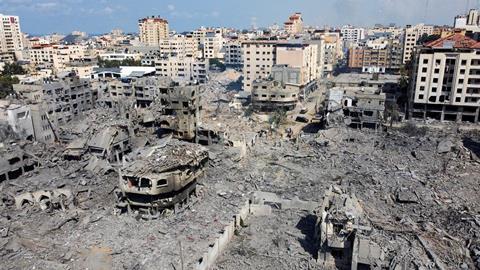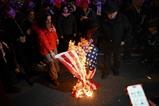Following Hamas’ brutal terror attacks, George Pitcher understands the pledges from Western leaders to “stand with Israel”. But he wonders if such statements of support are incomplete

The West’s response to the crisis in Gaza is acutely worrying because it is insufficient.
Gavin Drake’s excellent explainer on this website at the start of the week laid out lucidly how the region has arrived at the hellish choice between the complete destruction of Israel or Gaza. It’s incumbent on the United Nations to unravel that doomsday serpent-coil. And simple commitments to common cause fall well short of that aspiration.
Western leaders have united in their resolution that Israel has a right to defend her borders. Of course she does. The danger arises - after they have projected her flag onto their government buildings and sent armaments to assist her to do so - that these leaders then look away as Gaza is flattened in reprisal for Hamas atrocities committed on Israeli soil.
Don’t look away
This is where moral insufficiency in leadership occurs. The crimes against humanity committed by Hamas, in places such as the Kfar Aza kibbutz, cry out for vengeance. They are almost too horrific to witness, so we’ll look away as their victims are avenged.
The West is comprised of (predominantly) Christian states but, arguably, we don’t have the option of looking away from these horrors as they unfold in (predominantly) Jewish and Muslim jurisdictions.
The Christian quarters in Jerusalem have maintained an uneasy stability between Judaism and Islam
Prayer is vital under these circumstances. But the Christian voice needs to be articulated in action as well as prayer.
Just war?
To say we stand with Israel is an incomplete statement in this regard. It needs to be followed by vocalising what we stand for. And, whatever that is, it can’t be the destruction of a people as the price of the defeat of its terrorist leadership.
If that were the case, the Allied advance on Berlin from the west at the end of the second world war would have more closely resembled the horrific brutality of the advance of the Russians from the east. There was a moral assumption that the German people were not to pay, beyond reparations, for the crimes of Nazism.
To apply similar moral principle to the current crisis, it is right to defend Israel from Hamas, but it is right also to defend Palestinians from the crimes of Hamas.
The criteria of Augustine’s ‘Just War’ are a good place to start. One of the justifications for waging such a war is that it is proportionate. A scorched-earth policy in Gaza in reprisal for the massacre of families in Israel cannot be countenanced and we, in the West, should say so.
A Christian response
The Christian population across the holy lands of the Middle East has declined from about 20 per cent 100 years ago to just five per cent today. Today, less than two per cent of the population of Israel is Christian. Gaza has been a hostile environment for Christians since the Hamas takeover in 2007; out of a population of 2 million, perhaps 1,000 are Christian.
It’s incumbent on the United Nations to unravel the doomsday serpent-coil
This is not to suggest that Christian presence could change the course of Israel-Palestine armed conflicts. It didn’t prevent the six day war in the 1960s, or the intifadas since. But, as I have written before, the Christian quarters in Jerusalem have maintained an uneasy stability between Judaism and Islam, and their decline has made the city more volatile. As a buffer to conflict, the Christian role is diminished.
None of which is likely to comfort those suffering so dreadfully there. Perhaps, ultimately, we look for the holy voice in the wrong places. I don’t mean to misappropriate her faith or ethnicity in any way, but I think of the traumatised young woman who survived the massacre at the Re’im Supernova music festival.
Asked on ITV News if she wanted revenge, she replied through her tears quietly but firmly: “I don’t want revenge. I want peace.” There speaks the authentic voice of reconciliation.






































No comments yet